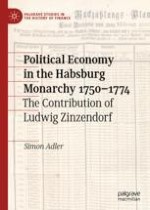2020 | OriginalPaper | Buchkapitel
7. Conclusion
verfasst von : Simon Adler
Erschienen in: Political Economy in the Habsburg Monarchy 1750–1774
Aktivieren Sie unsere intelligente Suche, um passende Fachinhalte oder Patente zu finden.
Wählen Sie Textabschnitte aus um mit Künstlicher Intelligenz passenden Patente zu finden. powered by
Markieren Sie Textabschnitte, um KI-gestützt weitere passende Inhalte zu finden. powered by
